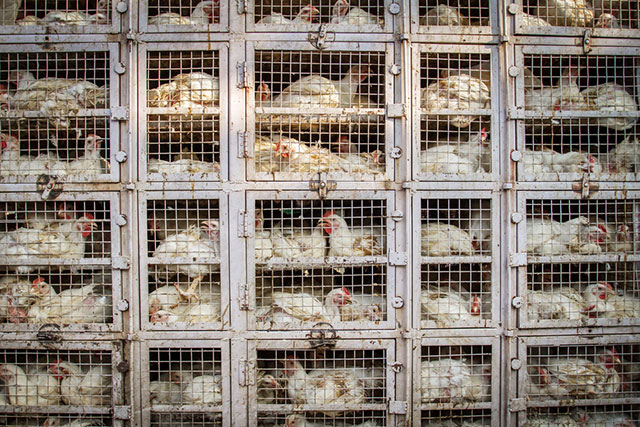
The environmental advocacy group Environment America has released an analysis that concludes meat manufacturer Tyson Foods is a bigger polluter of American waterways than Exxon, Dow, Koch and pretty much anyone else – with the sole exception of AK Steel Holding Corp (and AK Steel only wins by a hair).
The animal-slaughter mega-power is the world’s biggest processor of chicken, beef and pork, and is said to be the second largest meat producer in the world. While Tyson Foods’ website maintains it “[works] with thousands of family farmers every day to provide safe nutritious food for people all over the world,” animal rights and environmental groups paint a different picture of the company entirely.
Environment America’s summation notes that Tyson, like other behemoth polluters, is required to report certain emissions to the Environmental Protection Agency’s (EPA) Toxic Release Inventory (TRI) program. When Environment America “crunched the numbers,” it concluded the transnational meat marketer was responsible for “104 million pounds of pollutants into [US] waterways from 2010 to 2014” – and that’s excluding emissions in Tyson’s food-production footprint not required by the EPA for inclusion in TRI. Only its processing facilities are reported as part of the program.
“The company’s pollution footprint includes manure from its contract growers’ factory farm operations, fertilizer runoff from grain grown to feed the livestock it brings to market as meat, and waste from its processing plants,” the analysis states. In 2014 alone, the company dumped 20 million pounds of toxins into US waterways – a number that remained fairly consistent over a five-year period.
In Tyson’s case, much of that pollution includes nitrates from agricultural runoff, and water with high nitrate (NO3) and/or nitrogen (N) content is dangerous for wildlife, fish and humans.
Nitrate-tained water is known to cause several health problems for people including methaemoglobinemia and “blue baby syndrome” in infants – diseases that hinder the blood’s ability to carry oxygen to the cells. Babies are most susceptible and severe cases can be fatal.
Additionally, when nitrogen compounds from agricultural runoff make their way into lakes and reservoirs, algae blooms can result – devastating aquatic events that can swallow up the water’s oxygen, leading to fish-kills that can include hundreds-of-thousands, or even millions of fish.
Environment America’s analysis, and the ensuing media coverage, certainly don’t represent the first time the company has taken heat over bombing American waterways with poison. Natasha Geiling of Climate Progress reports:
Tyson’s pollution has been the subject of several legal challenges over the years, with the company paying more than $25 million in legal settlements and fines since 2001. Most recently, the Attorney General of Missouri filed a lawsuit against Tyson Foods accusing the company of illegally discharging untreated wastewater that led to the death of up to 100,000 fish. Tyson settled with Missouri in 2015 and agreed to pay.
Tyson Foods has been under high-level scrutiny as of late – not only for screwing up waterways, but for screwing up the lives of poor factory farm animals as well.
A shocking undercover video investigation carried out by animal rights group Mercy For Animals first surfaced in late August of 2015 – and what those recording showed left viewers stunned worldwide, and led to criminal charges being filed against six plant workers.
Those bombshell revelations were followed up by a hard-hitting, gruesome, and downright difficult-to-watch campaign video, narrated by Alec Baldwin – and that short film set the world on fire over Tyson’s blatantly egregious treatment of chickens.
Tyson’s website states, delivering safe healthy food “starts with ensuring the health and well-being of those [animals] by taking care of them properly – treating them responsibly and with respect. It’s simply the right thing to do” – a statement made almost laughable when pitted against Baldwin’s narrative.
Also noteworthy in regards to this story is the fact that Tyson’s shareholders recently failed to adopt a resolution to more responsibly address how the company tracks its water pollution. The company is set to vote on another resolution in 2016. Citizens concerned with the company’s operational track-record are now left to wonder if the myriad blows the company has been suffering in the media, both for its shady environmental and animal rights practices, will be enough to pressure Tyson’s Board to make a change.
Join us in defending the truth before it’s too late
The future of independent journalism is uncertain, and the consequences of losing it are too grave to ignore. To ensure Truthout remains safe, strong, and free, we need to raise $27,000 in the next 24 hours. Every dollar raised goes directly toward the costs of producing news you can trust.
Please give what you can — because by supporting us with a tax-deductible donation, you’re not just preserving a source of news, you’re helping to safeguard what’s left of our democracy.